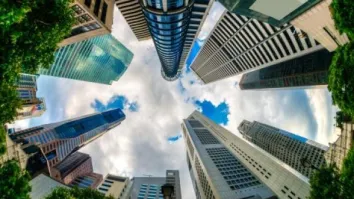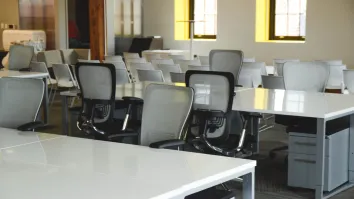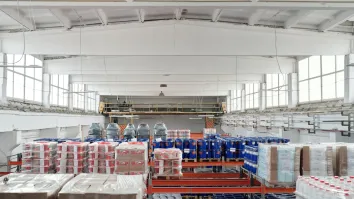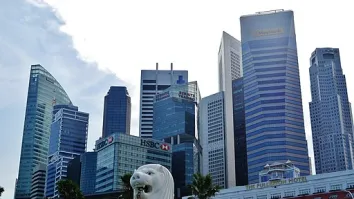
Older office buildings adopt open protocol systems for energy management
Experts also point to usage of building management systems for energy-saving opportunities.
Office building owners in Singapore are increasingly turning to open protocol systems for energy management to enhance efficiency and reduce environmental impact.
Samuel Han, head of Energy & Sustainability Management at Savills Singapore, said owners can seamlessly integrate new energy systems with older infrastructure by leveraging open protocols, which facilitate easy connections between equipment as long as application programming interface connections are permitted.
“For energy systems, recently they are all open protocol,” he told the Singapore Business Review.
Open protocols, openly published and accessible to all, are supported by various entities including corporations, user groups, professional societies, and governments. This support broadens users’ options for devices or systems tailored to their specific needs, as per a Schneider Electric report.
In building management systems (BMS), open protocols provide benefits such as widespread support from manufacturers and software vendors, availability of diverse third-party software, streamlined communication with subsystems, active community support, and future adaptability.
Amidst the challenges posed by old buildings, Han said their inherent efficiency often yields significant returns once modernised, making them prime candidates for energy-saving upgrades.
“For older buildings, they have greater benefits of installing the energy systems, because they will have higher payback. This is due to greater energy savings as older buildings tend to be less efficient,” he said.
Building Management Systems
Additionally, Han recommended utilising BMS for data analysis, empowering stakeholders to pinpoint energy-saving opportunities.
BMS are integral systems designed to control and monitor crucial energy-consuming components within buildings, including HVAC (heating, ventilation, and air conditioning), lighting levels, and security systems.
The expert also underscored the importance of addressing energy consumption, particularly attributed to HVAC systems, which can account for up to 70% of energy bills.
“We have to tackle that equipment to make it more efficient, and for an inefficient building to become an efficient building, it could save them 30% to 50% of the energy bills,” he said.
For Han, the key lies in a comprehensive approach that integrates regular maintenance protocols for essential equipment in plant rooms alongside sophisticated data tracking mechanisms, often supported by artificial intelligence (AI) solutions.
He said the transformation in the landscape of energy management in office buildings, where AI assists with fault detection and provides automated solutions, reduces manual labour.
New technologies
Office building owners have also increasingly embraced innovative technologies.
“The multi-comparison chiller, which operates efficiently under low occupancy levels, and IoT sensors that enhance data collection and analysis, have become increasingly popular,” Han said.
The expert also pointed out the importance of educating tenants on conservation through targeted initiatives.
“And from there, we can analyze and see where the shortfall is or where the low-hanging fruits are. They can do energy retrofits to better save their energy, and also to educate the tenants on energy and water savings by sticking posters on the walls, to educate them better on the importance of the environment,” he said.
“Awareness and understanding of energy data are key to identifying savings opportunities, and tenant education can foster a culture of sustainability,” Han advised.
Singapore’s commitment to optimising energy consumption and reducing environmental impact is evident through initiatives such as adopting solar photovoltaic systems and pursuing green building certifications like BCA’s Green
Mark and LEED, alongside data-driven energy management, optimised HVAC systems, and efficient water and lighting usage.
In 2005, the Green Mark certification scheme was introduced to evaluate buildings’ environmental impact and performance, promoting sustainable design and construction practices.
Sustainable energy strategy
Singapore has made significant progress in reducing its carbon footprint by transitioning from carbon-intensive fuel oil to natural gas for electricity generation.
At present, natural gas accounts for over 95% of Singapore’s fuel mix for electricity generation due to its lower carbon content per unit of electricity produced, according to the National Environment Agency.
Singapore aims to escalate its solar capacity to 2 GWp by 2030, supported by comprehensive energy storage deployment after 2025. Solar panels will also be strategically deployed on rooftops, reservoirs, and offshore locations to enhance clean energy supply and bolster energy security.
Additionally, the city state explores partnerships with neighbouring countries for cost-competitive energy through interconnected grids.
To mitigate carbon emissions, Singapore embraces innovative technologies like carbon capture and hydrogen solutions, demonstrating its leadership in combating climate change while ensuring sustainable economic growth.
Singapore is also broadening the scope of its Energy Efficiency Grant (EEG) scheme to encompass a wider range of businesses, including those in manufacturing, construction, maritime, data centres, and their users.
Initially launched in 2022 for sectors like food services, food manufacturing, and retail, the EEG aims to assist businesses by co-funding the acquisition of energy-efficient equipment.

















 Advertise
Advertise





